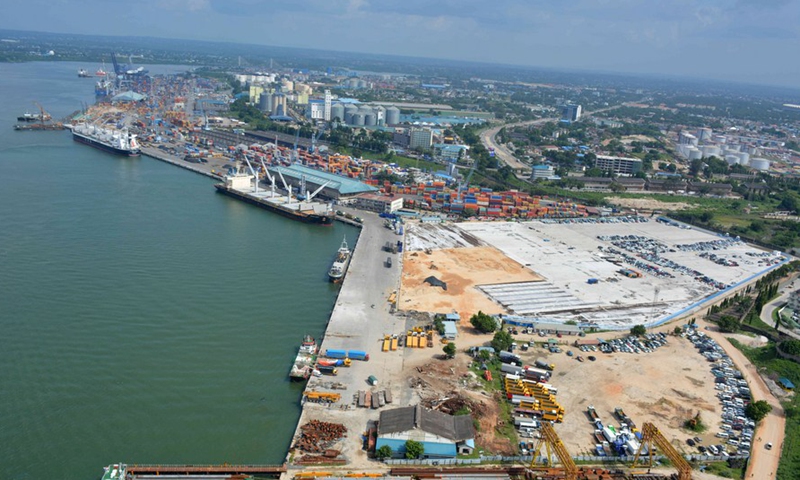
Photo taken on April 9, 2020 shows the Dar es Salaam Port undergoing upgrading of port berths 1 to 7 in Dar es Salaam, Tanzania. Photo:Xinhua
China's cooperation with Africa has shown no signs of abating, but shows a trend of embracing faster growth and increasingly innovative models even with challenges such as instigation from some Western countries as well as the pandemic, data in a newly released white paper on China-Africa cooperation revealed.
The white paper, released by China's State Council on Friday, elaborated on the achievements of cooperation between China and Africa ranging from vaccine donation to infrastructure building. The paper was published ahead of the Forum on China-Africa Cooperation (FOCAC) in Senegal.
The report showed that despite the challenges caused by the coronavirus outbreak in both regions, China's economic cooperation with Africa strengthened after the crisis. In the first nine months of 2021, China's trade with Africa surged 38.2 percent year-on-year to $185.2 billion. In 2020, China's investment in Africa increased by 57 percent on a yearly basis.
China also donated 200 million COVI-19 vaccines and 120 batches of anti-coronavirus materials to Africa, while writing off interest-free loans to 15 African countries due at the end of 2020.
According to information disclosed in the white paper, China-Africa cooperation had embraced many innovations either seldom tried by China or rarely implemented by other countries. One of them is China-Africa cooperation in the digital economy.
Wu Peng, Director-General of the Department of African Affairs of the Foreign Ministry, said during a press conference on Friday that China held an e-commerce promotion for African products in September which has generated "very good" results.
According to Wu, a batch of African countries' ambassadors in China came to promote their products, like Tanzania's coffee and Rwanda's chili, on China's e-commerce platforms, which has stimulated "surprising" consumption in China, judging by the economic output of those countries.
The white paper also showed that China offered a hand to Africa to remove the latter's "digital divide," by efforts like constructing more than half of Africa's wireless nodes and high-speed mobile broadband network, as well as helping construct Africa's first 5G independent commercial network.
Another highlight is the two sides' partnership in green industries.
China has helped build many clean energy projects in Africa, such as Kenya's Garissa Solar Photovoltaic Power Plant. China also signed agreements with 14 African countries to support the region in coping with climate change by jointly setting low-carbon demonstration plots and other measures.
Cui Hongjian, director of the Department of European Studies at the China Institute of International Studies, said that China and Africa can have a wide prospect for deepening environmental and green energy collaborations under China's carbon goals.
"It is expected that China and Africa can complement each other in green industry cooperation, using China's technical and production capacity advantages and Africa's climate advantages. China can also cooperate with coastal and island countries in Africa to help them prevent extreme weather and natural disasters," Cui told the Global Times on Friday.
China has innovated the way it carries out cooperation with Africa, such as adopting the Public-Private Partnership (PPP) and Build-Operate-Transfer (BOT), two models that were relatively new to Chinese investors in Africa, in infrastructure projects.
China-Africa cooperation used to rely on concessional loans which cannot be written off. The new model by leveraging some commercial funds can expand the source and the scale of funds to support larger infrastructure projects, Song Wei, a research fellow at the Chinese Academy of International Trade and Economic Cooperation, told the Global Times on Friday.
Such data and facts are also proof that China-Africa cooperation won't change despite some Western countries' attempts to incite controversies surrounding China's investment in Africa by such accusations as China is spreading "influence" in Africa and causing a huge debt to the region, experts said.
Assistant Foreign Minister Wu Jianghao said on Friday that the debt trap story was fabricated by some Western countries' governments and media, as no developing country involved has stepped up and accused China of causing a debt trap.
"We can't say that what Western countries offer is development aid, and what China offers is a debt trap. This is not logical," Wu said.
Wu Peng also said that China attaches great importance to Africa's capital demands, as well as their debt sustainability.
"To solve Africa's debt problem, China's point is to put the project on the benign operational track, so that the project can generate economic benefits and help African countries repay the debt," Song said.




